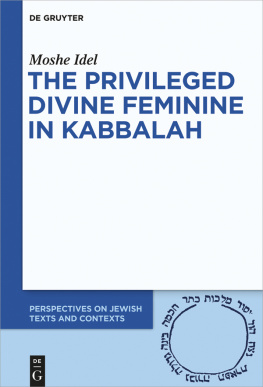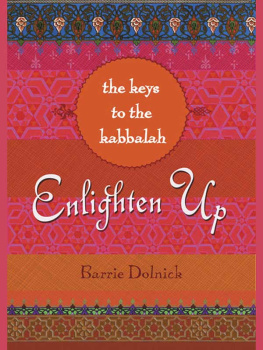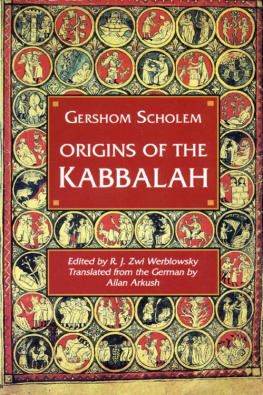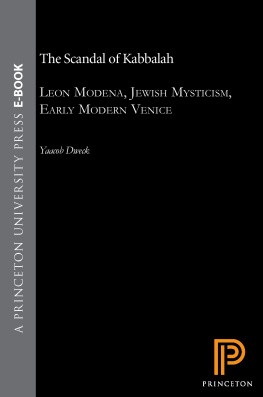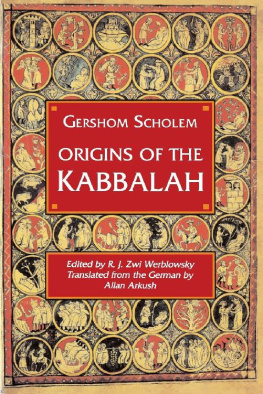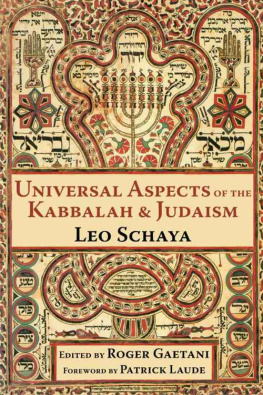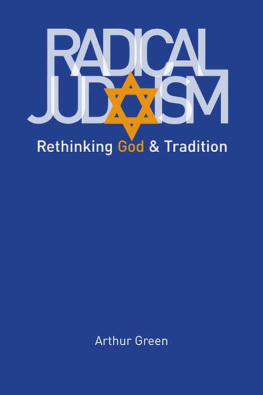ABSORBING PERFECTIONS
ABSORBING PERFECTIONS
KABBALAH AND INTERPRETATION
MOSHE IDEL

Published with the assistance of the Ernst Cassirer Publications Fund.
Copyright 2002 by Moshe Idel. All rights reserved.
This book may not be reproduced, in whole or in part, including illustrations, in any form (beyond that copying permitted by Sections 107 and 108 of the U.S. Copyright Law and except by reviewers for the public press), without written permission from the publishers.
Designed by Mary Valencia and set in Quadraat type by Keystone Typesetting, Inc.,
Orwigsburg, Pennsylvania.
Printed in the United States of America by Vail-Ballou Press, Binghamton, New York.
Cataloging-in-Publication Data
Idel, Moshe, 1947
Absorbing perfections: Kabbalah and interpretation / Moshe Idel.
p. cm.
Includes bibliographical references and index.
ISBN 0-300-08379-3 (alk. paper)
1. CabalaHistory. 2. Bible. O.T. PentateuchCriticism, interpretation, etc., Jewish. I. Title.
BM526 .1295 2002
296.16dc21
2001006563
A catalogue record for this book is available from the British Library.
The paper in this book meets the guidelines for permanence and durability of the Committee on Production Guidelines for Book Longevity of the Council on Library Resources.
10 9 8 7 6 5 4 3 2 1
The entire world is within
the Torah
and we are all of us in
the Torah
and from within it we see
and from it we do not stray.
ABRAHAM ABULAFIA, SEFER SITREI TORAH, 1280
There is nothing new
that is not found in the Torah,
neither the prophets, nor the Hagiography,
nor the sayings of the sages,
or what has been innovated
and will be innovated from now forever.
MOSES CORDOVERO, SEFEROR YAQAR, ca. 1555
Toute chose sacre
et qui veut demeurer sacre
senveloppe de mystre.
Les religions se retranchent
labri darcanes devoils
au seul prdestin:
lart a les siens.
STPHANE MALLARM, HRSIES ARTISTIQUES, 1862
Decipher! Decipher! Then you will experience
the vertigo of human absolute.
SALVADOR DAL
FOREWORD
HAROLD BLOOM
Moshe Idel, born in 1947, submitted his doctoral dissertation on the Kabbalah of Abraham Abulafia to the Hebrew University, Jerusalem, in 1976. In the quarter-century since, his researches and publications have reconfigured the field of Kabbalistic study, essentially founded by his majestic precursor, Gershom Scholem (18971982). Half-a-century younger than Scholem, Idel is both Scholems successor and his major revisionist. It is not too much to speak of the Kabbalah of Gershom Scholem and the Kabbalah of Moshe Idel, since these great scholars are as much visionary speculators as they are historians of what can be called Jewish mysticism, though I distrust that term and will not use it again here. ScholemI would not say in conversation since one learned to listen to himspoke with authority, and with more than a scholarly immersion in Kabbalah. One can speak of conversations with Idel, but there also one hears a Kabbalistic voice, experiential as well as historical, which speaks with authority in both realms.
I hesitate to describe the present book as Moshe Idels masterpiece, since his is a lifes work-in-progress, but Absorbing Perfections: Kabbalah and Interpretation is certainly his most important volume so far, fulfilling much of the project first set forth in Kabbalah: New Perspectives (1988). Since I myself am a literary critic and not a Kabbalistic scholar, this Foreword will address itself largely to three matters: the relationship between Scholems and Idels achievements; Idels account of the arcanization of the canon of the Hebrew Bible and of the exegetical modes that emerged to decode the arcana; the significance of Idel for interpretive procedures not in themselves Kabbalistic, nor even concerned with Kabbalah.
Kabbalah, a word meaning tradition with the nuance of reception, originally referred to the entire vast body of the Jewish Oral Law, but from about 1200 on it became more specific. The term was applied to the teachings of the Ravad (Rabbi Abraham ben David), the great sage of the twelfth-century Jews of Provence. His son, Isaac the Blind, composed the first texts of Kabbalah proper, as commentaries upon the Sefer Yezirah (Book of Creation), which exists in two tenth-century versions and which must be much older (perhaps third century). The Book of Creation says that God made the world with ten Sefirot (possibly just the numbers one through ten) and the twenty-two letters of the Hebrew alphabet.
There were many pre-Kabbalistic (a term no Kabbalist would accept) commentaries on the Book of Creation, all of them quite normative. The next esoteric work was the Book Bahir, or Book of Brightness, which scholars date as thirteenth century. We thus have the puzzle of a thousand years of Oral Tradition between the Book of Creation and Book of Brightness. To a true Kabbalist, this is no problem at all, since Kabbalah insists it is the esoteric side of the Oral Torah that Moses received from God at Sinai. In the Bahir, the Sefirot are what they have been ever since, the ten divine attributes, principles, or powers. Isaac the Blind circulated his treatises secretly, after dictating them to favorite disciples. It is generally agreed that Isaac re-created the Sefirot and that he reconceptualized God as the en-sof, an intranslatable Infinite. Kabbalah itself has a canonical text that is postbiblical, the Zohar of Moses de Leon, a book-of-books written in Guadalajara, Spain, from 1280 through 1286, but attributed by its author to much more ancient sages. The Zohar hardly required arcanization, but as the canonical work for Kabbalists it provoked exegetical speculation that transcends even its intricate splendors. From Isaac the Blind onward, the Kabbalah as Scholem and Idel study it was essentially formed, though the Zohar elaborated it magnificently.
Idels Absorbing Perfections: Kabbalah and Interpretation takes all this, and much more, as the given, and works on from there. His purpose is to show the Kabbalists very varied ways of locating the central values of the Hebrew Bible, and also to illuminate their modes of interpretation for revealing those values. This purpose was Gershom Scholems before it was Moshe Idels: what is the difference between these two masters of Kabbalah? Idels reverent critique of Scholem informs all his writings; in Messianic Mystics (1998), he speaks of an oftentimes critical dialogue with the magisterial studies of his precursor. In the most memorable chapter (7, Ancient Jewish Theurgy) of Kabbalah: New Perspectives, Idel dissents from Scholems great essay on Tradition and New Creation in the Ritual of the Kabbalists. Scholem contrasts the ritual of rabbinical Judaism, which makes nothing happen and transforms nothing with rituals established by Isaac Luria (15341572), the innovative genius who created later Kabbalism in Safed, Palestine. In Lurianic Kabbalah, myth reenters Judaism, according to Scholem. Idel regards this as Scholems own powerful myth, based upon a simplistic division between a defeated mythical Gnosticism and a triumphant rabbinism. Against this, Idel argues that ancient Jewish theurgy, the augmentation of God by man, continued throughout normative rabbinism. Idels emphasis upon the esoteric elements in ancient Jewish religion seems to me the center of his


